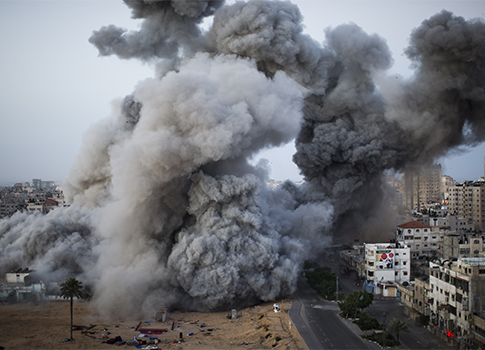Sudan has played a key role in arming Hamas militants with sophisticated Iranian-made rockets, experts said.
The Israeli Defense Forces’ (IDF) principal objective in Gaza is to rid Palestinian terrorists of sophisticated Iranian-produced rockets that are capable of striking deep into Israel’s heartland, including Jerusalem and Tel Aviv.
These rockets originated in Sudan and were then smuggled into Gaza with Iran’s help, sources said.
The existence of these advanced Fajr-5 rockets reveals the deepening ties between Iran and its terrorist proxies in Gaza and Sudan, where the rockets were housed before shipment.
"To put it simply, it was Iranian-made Fajr-5s, imported via Sudan, that prompted this war," said Jonathan Schanzer, vice president for research at the Foundation for the Defense of Democracies. "Iran's fingerprints are all over this."
Hamas terrorists in Gaza were provided around 100 Fajr-5 rockets by Iran. The rockets are capable of travelling nearly 50 miles, putting both Jerusalem and Tel Aviv within their reach. These missiles differ drastically from the crude rockets typically fired by Hamas terrorists.
The Fajr-5 missiles are believed to have been smuggled from Sudan into Gaza via Egypt’s porous Sinai region.
Sudan, a longtime ally of Iran, acted as a "key transit point" for these weapons, Schanzer said.
"[Sudanese capital] Khartoum has long been a transit point for Iranian-made rockets to Gaza," he said. "The smuggling route goes up through Egypt and across the Sinai [desert] into the tunnels and into Gaza."
Israel was the prime suspect after a weapons facility in south Khartoum mysteriously exploded in late October. The Jewish state’s attack on the Yarmouk military manufacturing facility was preventive in nature, experts said.
"I am convinced that the October bombing of an IRGC weapons factory in Khartoum was part one of this operation," Schanzer said. "The Israelis learned of a large cache of Fajr-5s and destroyed it there."
"But it appears that around 100 of them had already made it into Gaza," he added. "This prompted the Israelis hunt down the Fajrs during this latest round of fighting."
Several of the Fajr-5 missiles have landed near Jerusalem in the last week. Others have crashed by Tel Aviv, forcing more than a million Israelis to take refuge in bomb shelters.
Smuggling has become easier and less restricted in Gaza following the fall of former Egyptian President Hosni Mubarak, who was known to bar the passage of sophisticated weaponry such as the Fajr-5 missiles.
"One of the main ways that Hamas acquires weapons is via an extensive network of tunnels under the Gaza-Egypt border," the Israeli Defense Forces stated in a report earlier this month. "Since Hamas seized power in the Gaza Strip in 2007, the terrorist group’s smuggling efforts have increased. With funding from Iran, Hamas has improved its stockpile of weapons."
Israel’s current military incursion into Gaza is different from its 2008 Operation Cast Lead, Schanzer said.
"Cast Lead was about Israel sustaining too many rockets" from Gaza, he said. "This is about Israel trying to get rid of a certain kind of rocket. They had a very specific goal here."
Israeli Ambassador Michael Oren condemned Iran’s arming of Hamas in a recent interview with Fox News.
"Our problem is not our border with Gaza," Fox News quoted Oren saying on Monday. "Among the rockets being fired at us are the Fajr-5 rockets, which come directly from Iran. We know that Hamas terrorists have trained with the Iranians. There's a strong connection."
Terrorists in the Gaza Strip have also made use of Iranian-made M-75 rockets, which have reached areas near Jerusalem. The long-range rockets are believed to have been assembled with Iran’s help.
It was believed that Iran pulled funding for Hamas as economic sanctions and other factors lightened Tehran’s purse.
"There’s a prevailing assumption in Washington that Iran has been on the out with Hamas and that is absolutely wrong," Schanzer said. "Iran likely never left because it probably took months to smuggle these [weapons] in—the surprise here is that Iran is still very much a player in Gaza"
Fighting in Gaza dovetailed with a series of military drills in Iran that are being viewed as a warning to the West.
Iran has also helped hackers in the Gaza Strip launch cyber attacks on Israel, according to reports.
"The Iranians may not have ordered the day and hour for Hamas to launch its missiles, but they have been the guiding hand behind Hamas' rearmament," said Michael Rubin, a former Pentagon adviser on Iran and Iraq.
Others believe Israel’s campaign in Gaza is a prelude to an attack on Iran. The IDF has launched more than 1,300 air assaults on targets in Gaza.
"The last 6 days of fighting may in fact be a prelude to what looks like an increasingly inevitable military strike against Iran's nuclear program," said Jennifer Griffin of Fox News on Monday.
Iran’s increased presence in Gaza creates a new reality for Israel.
"Those who deny Iranian involvement with Hamas are like the new Truthers, those who couldn't be convinced that Al Qaeda was responsible for 9/11 no matter how many times Bin Laden claimed credit," said Rubin. "Let's just hope the White House and Langley aren't filled with these new Truthers."
